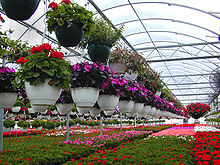 FLORICULTURE is fast emerging as a profitable venture and the country is also earning a sizable foreign exchange by exporting roses to Middle East and European countries.
FLORICULTURE is fast emerging as a profitable venture and the country is also earning a sizable foreign exchange by exporting roses to Middle East and European countries.
The local production of cut flowers is estimated at about 10,000-12,000 tons per annum. Roses are popular crop for both domestic and commercial cut flowers. They are harvested and cut when in bud and held in refrigerated conditions until ready for display at their point of sale.
Both local and grafted roses are grown in all the four provinces of the country, but Punjab has lion’s share in production of grafted roses and supply to all the cities of the country.
Roses may be grown in any well-drained soil with optimum sunlight. Most rose varieties are grown by budding on lower portion of a plant and propagated from seeds or cuttings. Clay soils, warm temperatures are always preferred, and the rose plants grow best when not set among other plants. Cow manure is the preferred fertilizer for rose cultivation, but other organic fertilisers, especially composts, are also used.
Rose plants usually require severe pruning, which must be adapted to the intended use of the flowers. Pattoki, a small town about 80-km south of Lahore, has emerged as a leading home for cut flower floriculture technology. More than one million pieces of cut flowers are sent daily from this town to all the major cities of the country. The availability of flowers and ornamental plants has recently increased with change in crop production priorities and rise in living standards. The availability of pick flowers of red rose in use since ages for garlands has increased manifold. Additionally, cut flowers for flowers arrangements have sprung up in market due to demand pull by the local consumers.
The demand for long stem roses, tube roses, gladioli has tremendously increased. In order to explain the cultivation of these plants, import of quality hybrid flower seeds and planting material may be allowed free of duty to promote production of quality leading to export. The small items of machinery and shading nets to be used by the flowers and ornamental plant nurseries should be exempted from the levy of duty.
Roses are best known as ornamental plants grown for their flowers in the garden and sometimes indoors. They have been also used for commercial perfumery and commercial cut flower crops. Some are used as landscape plants, for hedging and for other utilitarian purposes such as game cover. They also have minor medicinal uses. The majority of ornamental roses are selected hybrids. A few, mostly species roses are grown for scented foliage, ornamental thorns or for their ornamental fruit.
Rose perfumes are made from attar of roses or rose oil, which is a mixture of volatile essential oils obtained by steam distilling the crushed petals of roses. An associated product is rose water which is used for cooking, cosmetics, medicine and in religious practices. Rose water made as a byproduct of rose oil production, is widely used in Asian and Middle Eastern cuisine. The French are known for their rose syrup, most commonly made from an extract of rose petals.
By observing the rapid growth in cut flower export, this business can become Pakistan’s second largest export sector after textile if the government encourages the cut flower growers by facilitating them to provide better technology in the year round production, refrigerated transportation and exploring more foreign markets.
The world trade of cut flowers runs in billion of dollars and Holland serves as the centre of cut flower business.
The cut flowers trade is tremendously increasing due to its demand worldwide. The cut flowers importing countries are: Australia, Denmark, Dubai, France, Italy, Saudi Arabia, South Africa, Syria, Turkey, U.S.A. and United Kingdom and the major suppliers are Colombia, Ecuador, India, Israel, Kenya and Zimbabwe.
Courtesy The Dawn







